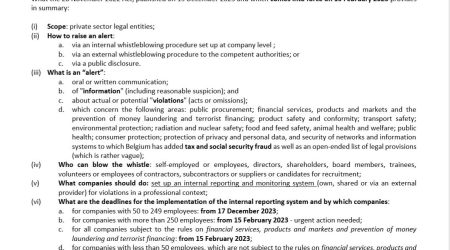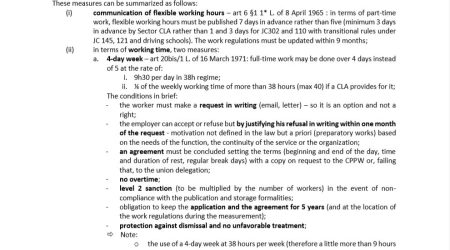Social Elections - Hidden Protection Period for Candidates
Posted the 15 January 2020By way of remainder, the members of the WC/ CPPW and their replacements as well as the non-elected candidates benefit from a protection against dismissal, which implies that they cannot be dismissed for reasons linked to the exercise of their mandate and a special procedure has to be followed to terminate their employment (even for serious cause). We will not revert here on these very complex and formal procedures.
The elected candidates are protected for 4 years.
The duration of the protection for the non-elected candidates is in principle the same as the duration for the elected employee representatives. However, the duration of the protection for candidates is limited to 2 years after the publication of the results of the elections if the employee is not elected during two successive elections (e.g. if an employee is candidate for the elections in 2016 and 2020 and is not elected, his protection will end in 2022).
The period of protection starts the 30th day before the day the date for the social elections is announced (X-30). Given the fact that an employee can submit his candidacy until 35 days after this date (X+35), there is a period of 65 days during which an employer can dismiss an employee not knowing that this employee is protected (this period is referred to as the "occult period") and thus in violation of the special dismissal procedure.
For the 2020 social election, the "occult" period will start at the earliest (depending on the date chosen for the social election – assumption first available date of 11 May 2020) on 7 January 2020 and will lapse on 17 March 2020.
The only way to prevent an employee from benefiting from any dismissal protection for the social elections (assuming they are not still protected for the 2016 elections – to be verified) is to actually notify the termination of the employment contract before they he is candidate to the social elections.
Now, as an alternative, one could terminate the employment before X+35 being the date where the list of candidates are notified or in other words during the “occult period”.
Indeed even if a candidate is already protected during the “occult period” there is a major difference in terms of protection as the employee is in this case obliged to request the reinstatement and if not he does not get any dismissal protection indemnity – as opposed to a termination after the occult period where the fixed protection indemnity of 2, 3 or 4 years of remuneration depending on the seniority is due even if the employee does not request the reinstatement. In other words, even if the employee is already candidate and protected, in the worst case you can still reinstate him and not pay anything.
Related articles

DEL-Law Newsletter - the Belgian legislation on the protection of whisle-blowers.
Our latest DEL-Law newsletter (in Fr, Dutch and Eng) re the complex and burdensome new procedure for the medical Act of God (Force majeure) in effect since 28 November 2022. With a summary of the main features of the said procedure. A must known for 2023..
